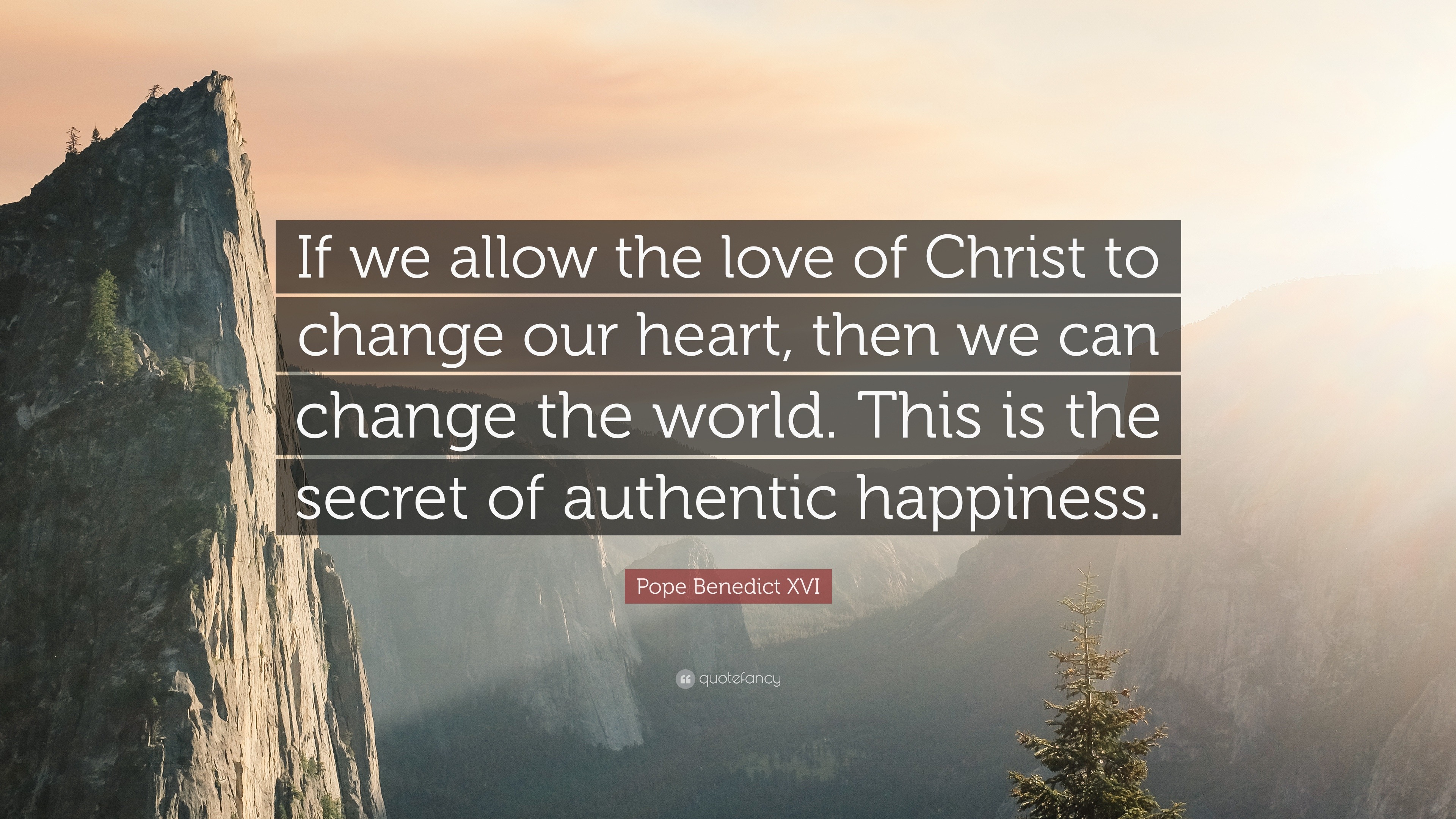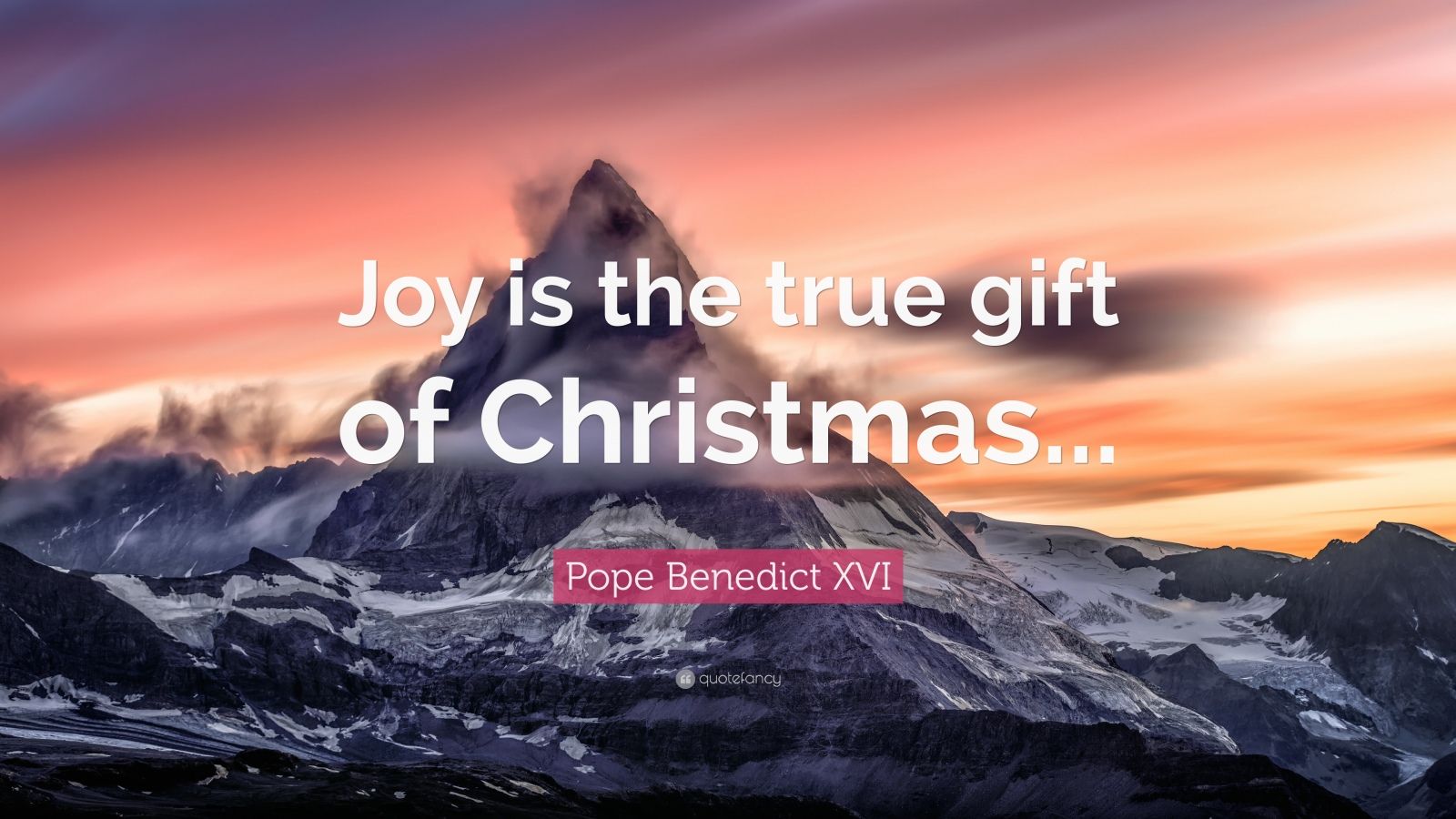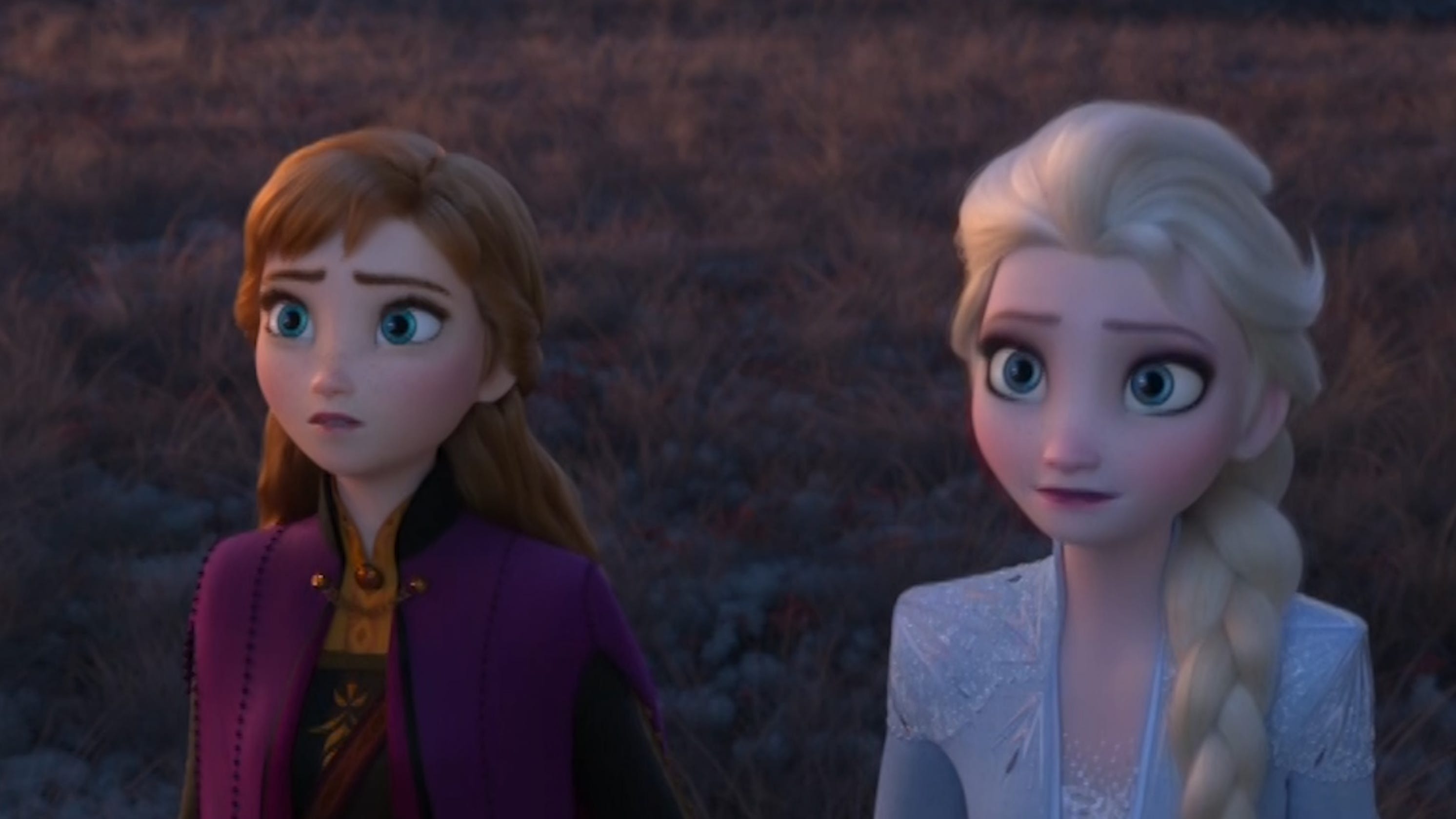If you're like me, a major fan of the adoptive father of the Christ-child, you're overjoyed at the announcement of The Year of St. Joseph, which Pope Francis announced on the Feast of the Immaculate Conception this past week! Also, if you're like me, you were a little surprised that this year of St. Joseph started the day it was announced! But I think the Holy Father is realizing the tremendous need we have in the world for the fatherhood of St. Joseph!
The Itinerant Catechist
Sunday, December 13, 2020
Year of St. Joseph: Not a Moment Too Soon
Perfect Joy in a Pandemic-Stricken World
Today is Gaudete Sunday! The third Sunday of Advent is known as "Gaudete!" or "Rejoice!" Sunday because it is considered the "past-the-halway-point" Sunday of Advent. We are so close to the end of Advent, which means we are so close to Christmas - the celebration and remembrance of Christ's first appearance in the world after 9 months in His mother's womb. We rejoice because we know that the Messiah is near - He is close, closer than ever as we accompany the Israelites awaiting Him through the readings of the Liturgy from the Old Testament.
My pastor gave another stirring homily today, and its major theme was the belief that we have as Christians that joy does not mean the same thing as happiness. That is to say, joy can be present and real, even in the midst of sorrow. How? Well, joy is a fruit of the Holy Spirit. As such, it comes in our lives as a result of our communion with God and lived relationship with Him in the life of grace. Joy is rooted in grace - it is determined by our closeness with the Lord, rather than by our feelings in the present moment like happiness is. My pastor connected this (as I was already doing in my brain, haha!) with the movie "Inside Out" and the way the film culminates in Joy and Sadness realizing that they do not have to compete; but rather, their cooperation actually makes for the most authentic and true memories and moments in the life of their person (Riley). It is good. It is so good to recognize that joy and sorrow do not exclude one another. Think of Our Lady - in the midst of her sorrow of sorrows at Calvary, she had the hope of the Resurrection still somehow alive in her; and in the moment of the Resurrection, her joy was more complete because she had embraced the sorrow of Calvary and its memory still was with her clearly.
As I reflected on this theme of authentic joy in the Christian life that is so often riddled with both joy and sorrow, a few favorite members in the Communion of Saints came to mind.
St. Francis of Assisi
G.K. Chesterton
Pope Emeritus Benedict XVI
The Rebellious Nature of Joy
Sunday, October 11, 2020
Providence and Liturgical Living
Praise post! I just had to come on here and say what a beautiful Mass I was blessed to attend this morning. Granted, we still can't sing (because COVID-19), and I cannot wait until we can sing again. But everything about today's liturgy was so profoundly connected to my own walk with the Lord. I was literally bouncing with joy at the end of Mass as I shared with others how loved I felt by the Lord in this Mass.
The opening hymn was Be Thou My Vision (which is the same tune as Lord of All Hopefulness, so I'm not sure which it was actually; but I love them both). Be Thou My Vision was one of my household's two main household songs during my time at Franciscan University of Steubenville. I was a member of Warriors of the Word women's household starting in the fall of 2013. Our spirituality was rooted in Scripture and oriented to the study of and prayer with Scripture. To this day, I still have a deep, deep love of the Word of God, and I am so thankful for the community I experienced among my household sisters during those formative years at Franciscan University. Our two household songs that we sang at almost every single Lord's Day celebration were Be Thou My Vision and At the Name of Jesus. Every time I hear these songs, I think of, pray for, and experience communion with my household sisters (past, present, and future), and I am reminded of the great gift of God that those years at a passionately Catholic university meant to me.
The readings today were excellent (of course) as well. What was awesome, though, was that I could tell (based on a conversation that I had with my pastor earlier in the week) where the homily was about to go before it even got there. My pastor pronounced the last word of today's Gospel, "chosen", with such emphasis that I had a premonition of what he was about to say. Sure enough, his homily was focused primarily on the new series The Chosen, and he even announced that the parish is going to host a watch party outside on the corner of the street where the parish is located this Tuesday. So, you'll know where to find me. Haha!
Feel free to listen to the homily here. It's great, and will hopefully get you interested in The Chosen, if you haven't seen it yet.
Sunday, September 27, 2020
A Serious Wake-Up Call
Humility and Forgiveness.
Today is the 27th Sunday in Ordinary Time, and the readings for today have a particular focus on two virtues: humility and forgiveness (specifically, the forgiveness and mercy of God). It struck me this morning that these two virtues, or to put it another way, the habits of humility and repentance, are virtues that seem to be more and more absent from our society. Yet, these virtues of humility and forgiveness are, according to the second reading today from Philippians, central in the life and mission of Jesus Christ.
Do nothing out of selfishness, or out of vainglory; rather, humbly regard others as more important than yourselves, each looking out not for his own interests, but also for those of others (cf. Philippians 2:1-11).
How many of us in the last week (or even the last 24 hours) have thought of ourselves as "better" than someone else? I do think this is something that we can fall into all too easily. But I also want to avoid the other extreme of self-deprecation. As someone who has struggled with scrupulosity, it is important to have a properly balanced view of things: yes, I am a sinner; but am I seeking the Lord with my whole heart each day, and do I repent when I fail? If the answer to both of those questions is "yes," then I can be confident that I am on the right path. In a similar vein, though, if I am growing complacent in my own relationship with God where I am unwilling to leave my comfort zone? Am I allowing myself to be stretched to grow into who I am made to be by being purified of even the small offenses against God or the tiny attitudes that are in need of purification within me? This is necessary to continue to grow in our relationship with God. We are called to desire God so much that even venial sins are unthinkable to us. Granted, that's going to take some work and it may be that we're still working on being purified of certain venial sins till the day we die. But all the same, do I want to let go of them? Truly want to be free of them? If I truly want that, then I will pursue the purification.
| "Death but not sin." -St. Dominic Savior, 14-year-old saint who made this promise when he received his First Communion |
Now when it comes to looking out for the interests of others, I think many of us would like to think that we do. We share posts and try to raise awareness so that we are being a voice for those who are on the fringes of society and whose dignity is not being upheld. That's a good thing. But here's perhaps a purifying reflection: do we desire the salvation of the souls of those whom we tend to despise?
I can hear the collective "Oof" as I type the words. Probably because it's coming from within me, too.
Do I desire that those who are distasteful to me ultimately end up in Heaven? That's a hard question. But I know the answer should be "yes."
Now, follow-up to that question: what are we doing to make that a reality? Do I pray for those whom I find difficult to love?
I highly recommend Fr. Josh Johnson's "Litany of the Body of Christ" in this particular instance. Insert the name of the person you are thinking of in this prayer, and keep repeating it until you find yourself receptive to the truth of it: "[Name] is the Body of Christ." If you are not sure if that person has been baptized into the Body of Christ, you can pray instead, "[Name] is the image and likeness of God."
When we can do this, when we can love our enemies and desire their salvation, we become the Body of Christ in the world: we become conformed to Jesus, washing the feet of Judas who would betray Him within hours.
Have in you the same attitude that is also in Christ Jesus, Who, though he was in the form of God, did not regard equality with God something to be grasped. Rather, he emptied himself, taking the form of a slave...he humbled himself, becoming obedient to the point of death, even death on a cross. (cf. Philippians 2:1-11)
Sunday, July 19, 2020
Weeds, Wheat, and Cancel Culture
Wheat and Weeds
Today is the 16th Sunday in Ordinary Time, and in today's Gospel Jesus tells the parable of the wheat and the weeds. The wheat is sown, but an enemy of the farmer sows weeds in the field. A faithful servant asks the farmer if he wants the weeds to be pulled up now. But the farmer says "no" because pulling up the weeds may also pull up the wheat. Instead, the farmer directs, leave both until the harvest. Then, and only then, will the weeds be sorted from the wheat and thrown into the fire.I think it can be all too easy for us to think to ourselves that we know who in this world is wheat and who is a weed. But to do so is to miss the point. Jesus is teaching specifically that the job of identifying and separating the wheat from the weeds is not within our power.
Saint Francis de Sales writes the following in his Introduction to the Devout Life:
"Of a truth, hasty judgments are most displeasing to God, and men's judgments are hasty, because we are not judges one of another, and by judging we usurp our Lord's own office. Man's judgment is hasty, because the chief malice of sin lies in the intention and counsel of the heart, which is shrouded in darkness to us. Moreover, man's judgments are hasty, because each one has enough to do in judging himself, without undertaking to judge his neighbor. If we would not be judged, it behooves us alike not to judge others, and to judge ourselves. ...for the most part we precisely reverse these precepts, judging our neighbor, which is forbidden on all sides, while rarely judging ourselves, as we are told to do."
As human beings with a fallen nature, we are often wrong about other people. Think about a person you know and love, of whom your first impression was very wrong. This is part of what makes us human - we learn over a period of time, and, as a result, we can make assumptions and judgments about other people that are incorrect because we lack information. (Classic example from literature: Elizabeth Bennett and Mr. Darcy in Pride and Prejudice.)
As an example from Scripture of what refraining from rash judgment looks like, Saint Francis de Sales offers us the image of Saint Joseph:
"...when St. Joseph found that the Blessed Virgin was with child, knowing her to be pure and holy, e could not believe that there was any sin in her, and he left all judgment to God, although there was strong presumptive evidence on which to condemn her. And the Holy Spirit speaks of St. Joseph as a 'just man.' When a just man cannot see any excuse for what is done by a person in whose general worth he believes, he still refrains from judging him, and leaves all to God's Judgment.
...Are we never, then, to judge our neighbor? you ask. Never, my child. ...It is forbidden to all men alike, as men, to judge one another."
In the words of Brene Brown: "Stay out of judgment. Not easy when you enjoy it as much as some of us do." (Watch her video on "Empathy vs. Sympathy". It's amazing.)
Cancel Culture
 |
| "You don't believe you and I could change things?" "I would change myself first." - Amazing Grace (2006) |
Patience
It's the Little Things
Prudence
Justice
Tuesday, June 30, 2020
Concluding Thoughts on Frozen II
Wow! We've been "in this together" (as much as I really get annoyed by that phrase) for like...3 months now? It feels like a lot longer than that. Maybe because even though very little seems to happen in my day-to-day so much is happening across the nation.
That probably is part of the reason why it's taken me so long to wrap-up on my review of the themes in Frozen II - literally, there's been so much other stuff that my brain has been encountering and processing as more and more comes to light. But I set out to do something, so we're going to finish! (Even though I'd rather be telling you about what I noticed during the Marvel movie marathon I undertook recently. But that'll wait until next time, I guess.)
Okay! Back to Frozen II.
Not so unlike a lot of us right now, while at the "river of memory", Elsa finds out that Arendelle has a complicated history. It turns out that Elsa's grandfather built the dam for the Northuldra as a power device. It wasn't to help them, but rather was meant to put a barrier on the magic that aided their livelihood. While her grandfather believes this is for the good of his own people, to shelter them from dangerous magic, Elsa understands now that magic (which she knows through experience) is not something to fear but something to utilize for the good of others.
Unfortunately, the narrative gets worse. But to follow it, Elsa must go deeper into Atohallen, thus confirming what Anna feared from their mother's song: "Not too far or you'll be drowned." But Elsa is determined to know what happened, and so she jumps. She learns that her grandfather was confronted by the Northuldra leader, who recognized that the dam was interfering with the livelihood of his people. But the king decided to "shoot the messenger" before he could get to the people, and so he murders the Northaldra leader before he can tell the people the truth. The resulting skirmish between Arendelle and Northuldra arises after this, which makes it all the more remarkable that Anna and Elsa's Northuldra mother would rescue Arendelle's heir to the throne. But I posit that Elsa and Anan's mother knew how to look beyond the circumstances and see the humanity. She saw a human being in danger, not an enemy. That's what motivated her to help, and the magic of the wood helped her to save his life because of her selfless choice - her agape, as it were. From Elsa's flashes of memories that her mother shares with her in Atohallen, it seems that Elsa and Anna's father knew his wife's heritage (she confides to him that she needs to tell him about her past), but I do wonder why their parents never told the princesses the whole story. Maybe they were waiting until they were older? (Though it is a Disney movie, so we all know how that goes - namely, if the protagonist wasn't raised by a single parent or isn't an orphan, they're in the rare few.) The only problem is, now that Elsa knows the truth, she's gone too far on her own to be able to return.
This is one area of the story where I felt like there was little development. Why can't Elsa return? The "not too far or you'll be drowned" verse obviously bears some significance, but why is that the case?
I think spiritually there is an answer perhaps, but only the start of one - and I don't think that this is what Disney meant to do, so I won't pretend to speak for them. A wise person once said: "Your heart is a scary place; don't go in alone." Their point was that in examining ourselves - our own hearts, our own stories, our own wounds - we shouldn't attempt to do it by ourselves. We must go into that interior journey with Christ. Otherwise, coming face-to-face with our own darkness can feel overwhelming, and we can be tempted to despair. But why is this true? I think because it relies on the false belief that we have to do all the heart/hard work ourselves before we come to Jesus. We think that we have to "have our act together" before we can be pleasing to Him. But Jesus never says this. He says "Come to me, all you who labor and are heavy-burdened, and I will give you rest." He doesn't expect us to be perfect, our clean up our mess, before we let Him in. He wants to be our companion on the journey - He wants us to do the work with Him. This is the part of the spiritual life called askesis, or the ascetical life. It's a partnership with the Lord - we have to do some work, yes; but we're not doing it alone. After all, "without [Him] we can do nothing." We need His grace to even begin the work of drawing near to Him. But it's a partnership. We walk with Him. We work with Him. This reminds me of one of the quotes that (I think) changed my whole perspective on grace:
"I do not at all understand the mystery of grace, only that it meets us where we are, and does not leave us where it found us." -Ann Lamott
But again, the warning label reads: "Don't go in alone." That's the great thing about grace: it's a gift. We don't have to earn it. We don't have to be worthy of it (because honestly, we can't be). We do, however, need to be receptive to it. We can't put up barriers and expect it to work in us effectively. This is why thinking of grace in a measurable way (like it's a quantity that we either have more or less of) can be problematic. Grace, we are told, is God's own life. The spiritual journey is essentially how deeply we are entering into that life of grace - how fully am I entering into God's own life of love and letting it transform me from within? ("We have to go down before we can go up," as Bishop Robert Barron is fond of saying; as in, we have to be transformed from within before we can start transforming what is outside of us.) This is where we should not go in alone - to ourselves. Don't descend into the depths of your soul without the grace of God and person of Christ accompanying you - otherwise, you might find yourself overwhelmed by the darkness and wickedness that you see you're capable of. The likely result of this without the presence of Christ is despair. But with Him? Transformation!
Now, let's return to Elsa - she's gone in alone. In this case, her likely companion would have been Anna. How Anna could have saved her from this, I'm not sure. Would they still have found out the whole truth? Again, I'm not sure. But I think there's both a warning and a sign in Elsa's choice. "Don't go in alone," of course. But is there a Truth worth dying for? As Christians, we know the answer. (I don't claim that the truth Elsa's in pursuit of is equivalent to the Truth of who Jesus is and what He has revealed. But all truth is somehow a facet or a fractel of the ultimate Truth. Jesus says in John 8:32 "...you will know the truth, and the truth will set you free.") As Elsa finds herself frozen to the spot of the dark woods where she witnesses the past, she looks toward the sky and in a final desperate motion sends a burst of magic into the sky as she calls out: "Anna!"
Meanwhile, Anna and Olaf are trying to find their way through the passageway they used to escape from the rock giants. Elsa's bursts of magic meets them along the way, taking the shape of their grandfather about to murder the weaponless Northuldra leader. Anna and Olaf realize this is from Elsa, and it's the truth. Olaf also recognizes: "That goes against everything Arendelle stands for." But Anna realizes there's only one way to set things right - they have to remove the dam that was a trick to hurt rather than a gift to help. This will mean that Arendelle will be destroyed because the force from the water will be too great. But the people are outside of the city, so they don't have to fear that people will get hurt. That's why the magic drove them out in the first place it seems.
Anna and Olaf find a way out, and Anna says they have to hurry because Elsa is probably on her way. But she stops as she notices a few snowflakes surrounding her, and then realizes they're coming from Olaf, who understands that he's fading away as the magic in him fades. This means Elsa must also be fading. Then (moment for tears), Olaf says: "Anna, I'm sorry. But you're going to have to do this next part on your own. Okay? ...Hey, Anna? I just thought of one thing that's permanent. Love."
 |
| Saint John of the Cross, author of "Dark Night of the Soul" |
Something of this dark night is expressed in Anna's solo: "The Next Right Thing".
I've seen dark before,
But not like this.
This is cold, this is empty, this is numb.
The life I knew is over,
The lights are out.
Hello, darkness.
I'm ready to succumb.
I follow you around,
I always have.
But you've gone to a place I cannot find.
This grief, has a gravity,
It pulls me down,
But a tiny voice whispers in my mind:
You are lost, hope is gone;
But you must go on,
And do the next right thing.
In the dark night of the soul, these feelings of numbness, emptiness, loneliness can overwhelm the soul so much that it can make it hard to recognize the presence of God. ("You've gone to a place I cannot find." But that place, is just deeper within...in the darkness, as well as beyond it.) Indeed, the whispers in our mind and soul can be very convincing - "you are lost, hope is gone." But we know that hope, in the Christian sense, is trusting in God even in difficult times. This is why the symbol of hope is an anchor. The anchor does not assure that storms will not come; but instead, it ensures that the boat will not stray far when the storm comes. What do we do in the darkness? What do we do when the storms arise? "Do the next right thing."
When I first heard this line in the movie, I was reminded of where I had first heard this phrase: Matthew Kelly's book: Perfectly Yourself: 9 Lessons for Enduring Happiness. I still have not finished this book, but I would pick it up at various points during my time in high school and my early college years. "Do the next right thing," was particularly a poignant quote for me. In the usual blur of questions about discernment and other challenges I was experiencing in human relationships, it was easy to be overwhelmed by the "what to do" question. But this statement, this mantra, made it so simple. The next right thing. Focus on that, and you'll be able to keep taking another step in the right direction. And isn't this how God deals with us? He does not lay out for us the whole map of our lives when we ask Him what He wants us to do. He just reveals the next step. One step at a time. These themes are definitely found within the song Anna sings. I think perhaps Anna is even discovering that there's something more than her relationships with others that makes it worth persevering (dare I say, persevering in faith). After all, those relationships all have been stripped away at this point: Kristoff is gone, Elsa is gone, Olaf is gone. She's "on her own," and yet...something drives her forward. This too, is an experience anyone who's been through a dark night or period of desolation can relate to. Sometimes it's hard to understand what to keep "rising for," as Anna says. But we do because we have faith; we do because we trust Him; we do because we love Him. Christ is our anchor in the midst of the darkness.
I won't look too far ahead
It's too much for me to take
But break it down to this next breath
This next step
This next choice is one that I can make
So I'll walk through this night
Stumbling blindly toward the light
And do the next right thing
And with the dawn, what comes then?
When it's clear that everything will never be the same again
Then I'll make the choice
To hear that voice
And do the next right thing.
Anna goes on with her plan - break the dam. This is also reflective of Catholic spirituality. Many of the saints advise those in desolation not to make any major decisions or changes until the desolation has passed. The idea is to stay faithful - to stay rooted in Christ - until the storm passes. (Granted, there may be moments where that's not possible; but that's why having a spiritual director and a regular prayer life are so important.)
Anna gets the attention of the earth giants so she can lead them to the dam and crush it. So naturally, Anna's trying to outrun the giants and it's not going well. This is the moment where my affinity for Kristoff was beautifully confirmed. He comes to Anna's rescue, and there's no: "What the heck? Where did you go?" or explanation demands. All he says is: "I'm here. What do you need?" Talk about a good model of relationship when someone's in a rough patch - "I'm here. What do you need?" (Now I'm not saying that there shouldn't be better communication; that's needed. But in this exact moment a conversation about the failures on both sides is not going to be super fruitful while you're also trying to not get crushed by earth giants. And this conversation does begin before the movie is over, so that's good.) As the dam is destroyed and the waters release, the magic holding Elsa down is broken.
Back at Arendelle, the people watch as the waters start to close in on their city, but Elsa and her new friend (the water-spirit-horse) stop the destruction. Although...personally, I was a little disappointed in this choice by Disney. For something new to be built, at times the old has to be sacrificed. So, I think it would have been more powerful if Arendelle had been forced to rebuild. But, I digress. (Also, gotta say that I enjoyed how this movie didn't make Anna "pretty cry", but she's actually a little bit of a mess when she sees Elsa again. It's the little things.)
As the movie concludes, Elsa and Anna both find their callings. Elsa remains with the Northuldra people, to guide the people as their leader. Anna and Kristoff return to Arendelle, where Anna serves Arendelle as queen. The two sisters take different paths, and come to their vocation through struggle and self-discovery. But they both find themselves where they're meant to be in the end: where their gifts and identity meld into their vocation in a way that mirrors the divine plan. (And yes, Kristoff finally gets his moment and asks Anna to marry him.)
While I did notice some underlying "political" themes in the film, it didn't really bother me because I think the movie lends itself to the human dimension of the problems, which is what we should all keep in mind: (a) that human beings are affected by the choices of leadership; (b) that human beings (past, present, and future) make mistakes that at times call us to use our knowledge of the truth to make changes for the better; and (c) all of this can be done (by God's grace) without dehumanizing either side. But that wasn't my main take-away from the movie, so I didn't comment on it much.
I'd be interested to hear what other's thoughts were on the movie, whether you agree or disagree with my own. Please feel welcome to comment and share. (Good rule of thumb for commentators: "Truth IN charity," folks.)
To close, I'd like to share a short passage from St. Paul's letter to the Romans, chapter 8, about "transformation," which Olaf reminds everyone was bound to take place in the forest.
For creation awaits with eager expectation the revelation of the children of God; for creation was made subject to futility, not of its own accord but because of the one who subjected it, in hope that creation itself would be set free from slavery to corruption and share in the glorious freedom of the children of God. We know that all creation is groaning in labor pains even until now; and not only that, but we ourselves, who have the firstfruits of the Spirit, we also groan within ourselves as we wait for adoption, the redemption of our bodies. For in hope we were saved. Now hope that sees for itself is not hope. For who hopes for what one sees? But if we hope for what we do not see, we wait with endurance.
In the same way, the Spirit too comes to the aid of our weakness; for we do not know how to pray as we ought, but the Spirit itself intercedes with inexpressible groanings. And the one who searches hearts knows what is the intention of the Spirit, because it intercedes for the holy ones according to God’s will.
We know that all things work for good for those who love God, who are called according to his purpose (Roman 8:19-28).
Till next time, we wait in hope.
The Itinerant Catechist
Tuesday, April 14, 2020
A Month into the Unknown (Thoughts on Frozen II cont'd)
To review:
(1) Elsa is hearing a mysterious voice (a singing voice to be specific) and feels drawn to find where it's coming from and where it's calling her to. She has an insight that it has something to do with an enchanted forest their father told her and Anna about when they were little.
(2) Anna is enjoying the comforts of having those she loves surrounding her and does not want things to change. She is also concerned about and protective of Elsa, not wanting anything to happen to her. She's determined to stand by her sister, no matter what.
(3) Kristoff is waiting for the right moment to pop the question, while also supporting and helping Anna and Elsa.
(4) Olaf is providing comic relief, but also some significant insights here and there.
Journey of Discovery
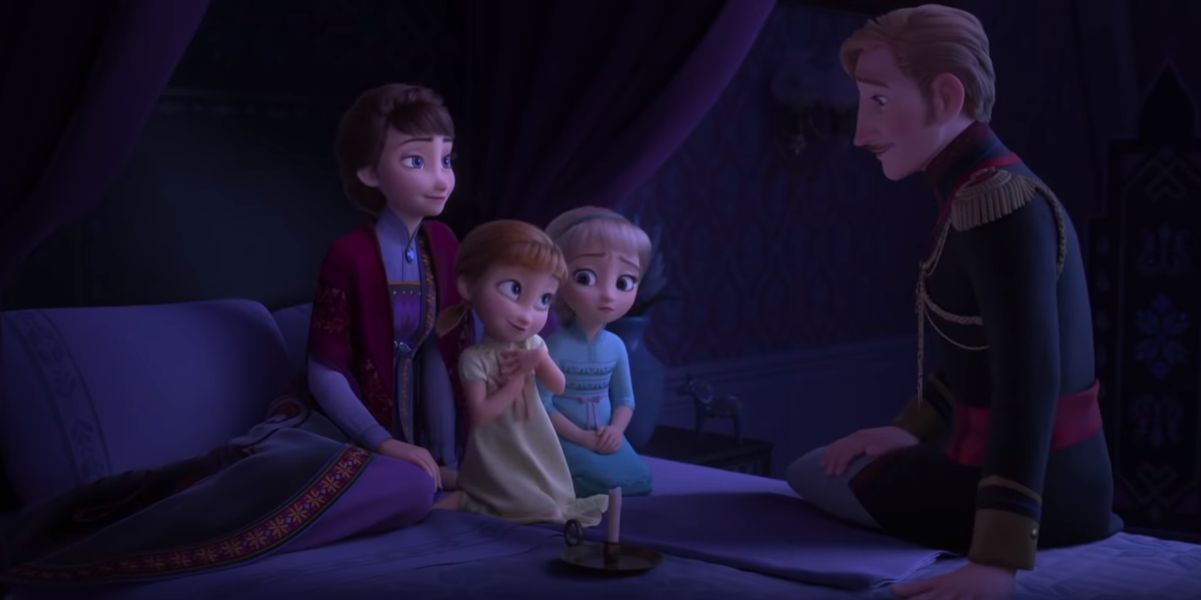
(I almost forgot to mention - in between all of this there is quite a comical song by Olaf, where he sings about the belief that everything will make sense when he is older. As a young adult still navigating all the changes involved in going from being a student to holding down a job and paying bills, this one really made me chuckle.)
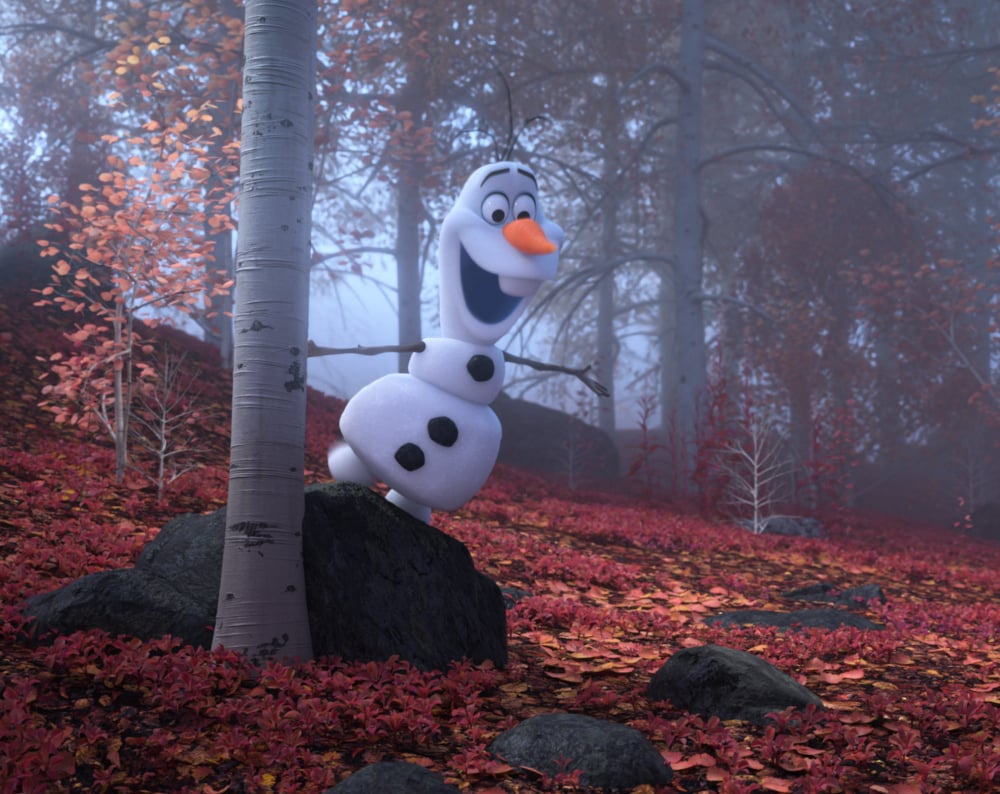 As night falls, the sisters and company join the Northaldra in their camp to rest until morning. While there, Elsa and one of the Northaldra (Honey Maren) have a conversation about the 4 spirits, and Honey Maren shares that there's a belief that there is actually a fifth spirit that holds the other 4 in balance. Elsa wonders where to find this spirit, thinking it must be what's calling her, and she recalls the words of her mother: "Only Ahtohallan [the river of memory] knows." Elsa determines that she must find Ahtohallan to find answers.
As night falls, the sisters and company join the Northaldra in their camp to rest until morning. While there, Elsa and one of the Northaldra (Honey Maren) have a conversation about the 4 spirits, and Honey Maren shares that there's a belief that there is actually a fifth spirit that holds the other 4 in balance. Elsa wonders where to find this spirit, thinking it must be what's calling her, and she recalls the words of her mother: "Only Ahtohallan [the river of memory] knows." Elsa determines that she must find Ahtohallan to find answers. 





